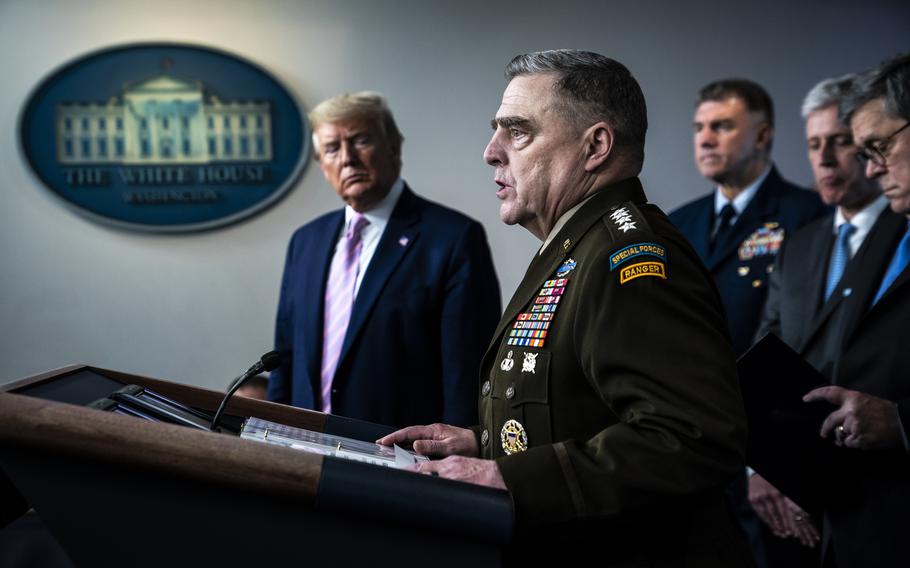
President Donald Trump listens as Gen. Mark A. Milley, chairman of the Joint Chiefs of Staff, addresses the White House press corps in April 2020. (Jabin Botsford/Washington Post)
WASHINGTON - President Donald Trump ordered the Pentagon to rapidly pull all U.S. troops from Afghanistan and Somalia in the immediate aftermath of his 2020 election loss to Joe Biden, alarming senior aides who feared doing so would have "catastrophic" consequences, according to congressional testimony aired Thursday.
Rep. Adam Kinzinger (R-Ill.) cited Trump's order during a House select committee hearing scrutinizing the former president's actions and directives ahead of the U.S. Capitol riot on Jan. 6, 2021. It was evidence, the congressman said, that Trump knew his days in office were numbered as he sought to overturn Biden's election win and "rushed" to complete "unfinished business" despite the national security implications.
"He disregarded concerns about the consequences for fragile governments on the front lines of the fight against [the Islamic State] and al-Qaeda terrorists," Kinzinger said. "Knowing he was leaving office, he acted immediately and signed this order on November 11th, which would have required the immediate withdrawal of troops from Somalia and Afghanistan, all to be complete before the Biden inauguration on January 20th."
Trump's withdrawal order was reported previously by Axios and in the book "Peril," by journalists Bob Woodward and Robert Costa. Kinzinger's presentation, however, marked a dramatic moment in Thursday's hearing, as the committee played video and audio segments of testimony provided over the past several months by key officials troubled by the president's plans, including Army Gen. Mark A. Milley, chairman of the Joint Chiefs of Staff; and retired Army Lt. Gen. Keith Kellogg, who served as national security adviser to Vice President Mike Pence.
The Afghanistan plan ultimately was set aside. Milley called the order "odd" and "potentially dangerous," telling the committee he did not think it was feasible or wise. Kellogg said the proposition was "very contested," and that carrying it out would have been a "tremendous disservice to [the] nation."
"It's the same thing with President Biden," Kellogg said, comparing the situation to the chaotic and deadly withdrawal carried out at Biden's direction in August 2021. "It would have been a debacle."
John McEntee, an adviser to Trump, recalled typing up the order to withdraw from Afghanistan and securing Trump's signature on it. He did not offer an assessment similar to Milley's and Kellogg's in testimony aired Thursday.
Their comments add to public understanding of key military moves that bridge the two presidencies, and the often erratic nature of deliberations under Trump.
The Trump administration, in February 2020, signed a deal with the Taliban agreeing to remove all U.S. troops by spring 2021. It included a handful of concessions, including that the Taliban would hold fire against U.S. troops as they departed. The Afghan government was cut out of those discussions.
Trump later undermined that agreement, tweeting in October of that year that all U.S. troops should be "home by Christmas!" Then-Defense Secretary Mark T. Esper sent Trump a memo advising the president that ongoing Taliban attacks, potential danger for remaining U.S. personnel and risks to U.S. alliances made that timeline unworkable.
Trump fired Esper on Nov. 9, one day after the election loss, installing loyalists at the Pentagon at a moment when administrations typically seek a smooth transition on issues of national security.
Biden decided in April 2021 to follow through with the Afghanistan withdrawal, prompting the collapse of the country's government four months later. Biden administration officials blamed Trump, saying his deal with the Taliban left few alternatives, while former Trump administration officials sought to distance themselves from the agreement by arguing that it was meant to be implemented only if the conditions warranted.
Trump has criticized Biden for the haphazard exit, calling it a "humiliation" and "total surrender," and claiming it would not have happened on his watch.
"We could have gotten out with honor," Trump said at a rally last year. "We should have gotten out with honor. And instead we got out with the exact opposite of honor."
Alyssa Farah Griffin, a former Trump administration official who has become a frequent critic, tweeted Thursday that as "someone who remains highly critical of Biden's Afghanistan withdrawal," she'd be curious to hear how Trump supporters defend "Trump's order for an even hastier withdrawal."
Under Trump's direction, hundreds of U.S. troops were withdrawn from Somalia in the waning weeks of his administration. Some were redeployed to nearby Kenya while continuing to visit Somalia to advise local troops battling al-Qaeda-affiliated militants.
In May, Biden reversed Trump's Somalia order, deploying hundreds of U.S. troops there. Pentagon officials sought presidential approval to do so, advising that it was becoming increasingly unsustainable to only appear on the ground episodically to carry out operations. The Pentagon has conducted a handful of airstrikes in Somalia since then.